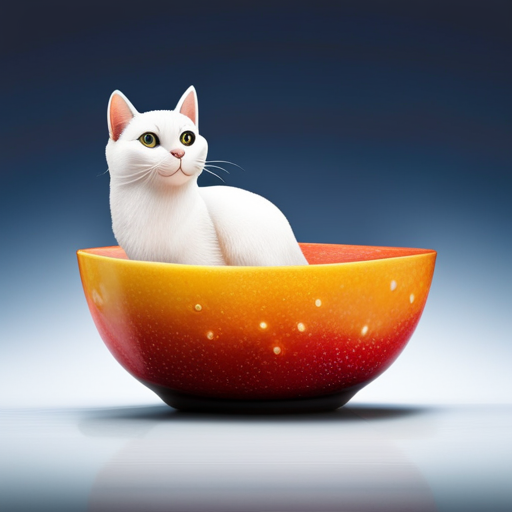Navigating the world of feline nutrition can feel like walking through a minefield, especially when considering treats like sherbet. You might think a little taste of this sugary dessert couldn’t hurt your furry friend, but it’s essential to understand the ingredients in sherbet and how they might affect your cat’s health.
From the risks of sugar overload to lactose intolerance issues, there’s a lot to consider before sharing your favorite frozen treat. Furthermore, with safer alternatives available, you’ll want to explore how you can indulge your cat’s sweet tooth without compromising their well-being.
So, let’s examine why reaching out to your veterinarian before introducing new treats into your cat’s diet is a step you shouldn’t skip.
Key Takeaways
- Sherbet contains sugar and dairy, which can lead to obesity and lactose intolerance symptoms in cats.
- Flavor additives and artificial colors in sherbet may be toxic to cats.
- Safer treat alternatives include homemade recipes or vet-recommended cat treats.
- Consult a veterinarian before introducing new treats like sherbet to a cat’s diet.
Understanding Sherbet Ingredients
Before considering feeding sherbet to your cat, it’s crucial to scrutinize its ingredients for potential health risks. Notably, flavor additives and artificial colors are common in sherbet, and they pose a real concern for your cat’s well-being.
Flavor additives are chemicals added to enhance taste, but they’re not always safe for feline consumption. Your cat’s digestive system is significantly different from yours, and what’s harmless to you could be toxic to them. It’s important to remember that cats have specific dietary needs and introducing unfamiliar substances can lead to unwanted health issues.
Similarly, artificial colors, used to make sherbet visually appealing, can be harmful to cats. These synthetic compounds have been linked to behavioral issues and various health problems in animals. The risk they pose isn’t worth the momentary pleasure of sharing your dessert.
In essence, when you’re tempted to treat your cat to a spoonful of sherbet, consider the potential risks posed by flavor additives and artificial colors. Your cat’s health and safety should always come first, and there are plenty of cat-friendly treats that are a safer choice.
Health Risks of Sugary Treats
While considering the potential dangers of flavor additives and artificial colors in sherbet for cats, it’s also vital to address the health risks associated with its high sugar content. Sugary treats like sherbet can lead to several health issues in cats that you, as a pet owner, should be wary of. It’s not just the immediate pleasure of seeing your cat enjoy a sweet treat; you’re also potentially exposing them to long-term health risks.
-
Dental Decay: Cats are no exception when it comes to the dangers of sugar on dental health. Regular consumption of sugary foods can lead to dental problems, including decay and gum disease.
-
Obesity Concerns: The high caloric content in sugary treats like sherbet can contribute to obesity in cats. Excess weight carries a host of health issues, including diabetes and joint problems.
-
Altered Behavior: High sugar intake can cause fluctuations in your cat’s energy levels, potentially leading to hyperactivity followed by crashes.
-
Nutritional Imbalance: Feeding your cat sugary treats can lead to a nutritional imbalance, depriving them of the essential nutrients they need for a healthy life.
Lactose Intolerance in Cats
In addition to the risks posed by high sugar content, it’s important for you to understand that many cats are lactose intolerant, which can complicate feeding them treats like sherbet. Lactose intolerance in cats is due to an enzyme deficiency. Specifically, they lack enough of the enzyme lactase, which is necessary for breaking down lactose found in dairy products. This deficiency can lead to various digestive symptoms that are uncomfortable for your cat and can be concerning for you.
When a lactose-intolerant cat consumes lactose, the undigested lactose moves into the large intestine, where it can cause symptoms such as diarrhea, vomiting, stomach cramps, and bloating. These symptoms don’t just cause discomfort; they can also lead to dehydration and other health issues if not addressed promptly.
It’s crucial for you to recognize these potential issues when considering dairy-based treats like sherbet for your cat. The combination of high sugar content and the likelihood of lactose intolerance makes such treats a poor choice for feline companions. Monitoring your cat for any signs of digestive distress after consuming dairy products is essential, and opting for safer, more suitable treats will help ensure their health and happiness.
Safer Treat Alternatives
Given the concerns surrounding dairy-based treats like sherbet for cats, it’s critical to explore safer treat alternatives that won’t compromise their health. Transitioning to options that align with a cat’s dietary requirements is essential for their well-being.
Here are some safer and healthier choices:
-
Homemade recipes: Crafting treats at home allows you to control the ingredients, ensuring they’re safe and beneficial for your cat. Consider using lean meats or fish as the base for these treats.
-
Commercially available cat treats: Opt for treats specifically designed for cats, which consider their nutritional needs and avoid harmful additives.
-
Nutritional supplements: Some treats come fortified with vitamins and minerals that can supplement your cat’s diet, contributing to their overall health.
-
Fresh, cat-safe vegetables: Small amounts of steamed vegetables like carrots or broccoli can be a healthy snack. They provide fiber and are low in calories.
It’s crucial to introduce any new treats gradually and in moderation. Always prioritize treats that contribute to their nutritional well-being, steering clear of those that could lead to adverse health effects. Remember, treats should complement, not replace, a balanced diet tailored to your cat’s specific needs.
Consulting Your Veterinarian
Before introducing any new treats to your cat’s diet, it’s crucial to consult with your veterinarian to ensure they’re suitable and safe. Your vet can offer personalized advice based on your cat’s health history, age, and existing dietary needs. They’re trained to identify potential risks and can conduct allergy assessments if necessary. This step is vital because, like humans, cats can have allergies to certain foods, which mightn’t be immediately apparent without professional input.
Moreover, your vet can inform you about any possible medication interactions. If your cat is currently on medication, some ingredients in treats like sherbet could interfere with its effectiveness, potentially putting your cat’s health at risk. It’s not just about the immediate reaction; long-term effects need to be considered as well.
Conclusion
Before reaching for sherbet as a treat for your cat, remember that nearly 90% of adult felines are lactose intolerant. Feeding them sugary, dairy-based treats like sherbet can lead to unnecessary health issues.
It’s crucial to prioritize their well-being by choosing safer, cat-friendly alternatives. Always consult your veterinarian for guidance on the best treats for your furry friend.
By doing so, you’re ensuring a happier, healthier life for them, which is ultimately what every pet owner wants.

